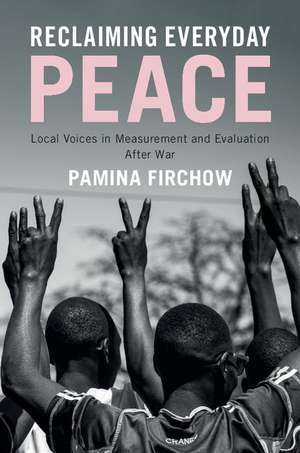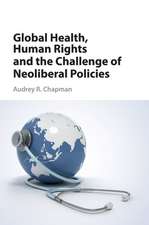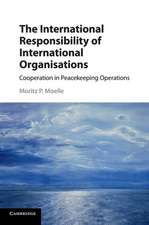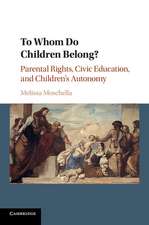Reclaiming Everyday Peace: Local Voices in Measurement and Evaluation After War
Autor Pamina Firchowen Limba Engleză Paperback – 19 sep 2018
Preț: 275.40 lei
Nou
Puncte Express: 413
Preț estimativ în valută:
52.70€ • 56.35$ • 43.94£
52.70€ • 56.35$ • 43.94£
Carte tipărită la comandă
Livrare economică 17 aprilie-01 mai
Preluare comenzi: 021 569.72.76
Specificații
ISBN-13: 9781108402767
ISBN-10: 1108402763
Pagini: 206
Ilustrații: 19 b/w illus. 3 tables
Dimensiuni: 150 x 228 x 12 mm
Greutate: 0.31 kg
Editura: Cambridge University Press
Colecția Cambridge University Press
Locul publicării:New York, United States
ISBN-10: 1108402763
Pagini: 206
Ilustrații: 19 b/w illus. 3 tables
Dimensiuni: 150 x 228 x 12 mm
Greutate: 0.31 kg
Editura: Cambridge University Press
Colecția Cambridge University Press
Locul publicării:New York, United States
Cuprins
Introduction; Part I. Understanding Everyday Peace: 1. Measuring peace; 2. Who counts in the measurement of peace?; 3. A new approach to measuring peace; Part II. Evaluating Everyday Peace: 4. Everyday peace in Uganda and Colombia; 5. The multidimensionality of everyday peace; 6. Why do local interventions fail and why do they succeed?; Conclusion; Appendices.
Recenzii
'Reclaiming Everyday Peace develops a new approach to measuring conflict resolution - based on local perceptions and priorities instead of external ideas and values. Scholars will appreciate Pamina Firchow's original, novel, and counter-intuitive findings, such as the fact that communities that experience more intervention feel less secure. I also hope that policy-makers and practitioners will heed her call to use everyday indicators of peace during the design, implementation, and evaluation of conflict-resolution initiatives, as this would help address many of the issues that peacebuilders usually face.' Severine Autesserre, author of Peaceland and The Trouble With the Congo
'People in conflict zones need their voices to be heard. Firchow provides a new and useful methodology for hearing people's voices in conflict-ridden areas of the world, and then using those voices as input into policy evaluation. This book will prove invaluable to researchers, policy-makers, and policy evaluators working to resolve violent conflicts around the world.' Gary Goertz, Kroc Institute for International Peace Studies, University of Notre Dame, Indiana
'In this seminal book, Pamina Firchow provides much-needed rigor to the challenge of understanding peace from below. In a path-breaking analysis of what local people affected by armed conflict identify as the priorities of peace building, she sets a new agenda for researching local standards and identifying bottom-up indicators of peace.' Alex de Waal, Executive Director of the World Peace Foundation, Tufts University, Massachusetts
'Firchow's approach is innovative and well thought out … [her] findings are valuable.' Richard Caplan, International Peacekeeping
'This book provides the tools through which to transform peacebuilding programmes, but it also has the capacity to influence a wider field of research, as it seeks to address the long standing, structural power imbalance inherent within conflict intervention.' Sarah Edgcumbe, CVIR
'People in conflict zones need their voices to be heard. Firchow provides a new and useful methodology for hearing people's voices in conflict-ridden areas of the world, and then using those voices as input into policy evaluation. This book will prove invaluable to researchers, policy-makers, and policy evaluators working to resolve violent conflicts around the world.' Gary Goertz, Kroc Institute for International Peace Studies, University of Notre Dame, Indiana
'In this seminal book, Pamina Firchow provides much-needed rigor to the challenge of understanding peace from below. In a path-breaking analysis of what local people affected by armed conflict identify as the priorities of peace building, she sets a new agenda for researching local standards and identifying bottom-up indicators of peace.' Alex de Waal, Executive Director of the World Peace Foundation, Tufts University, Massachusetts
'Firchow's approach is innovative and well thought out … [her] findings are valuable.' Richard Caplan, International Peacekeeping
'This book provides the tools through which to transform peacebuilding programmes, but it also has the capacity to influence a wider field of research, as it seeks to address the long standing, structural power imbalance inherent within conflict intervention.' Sarah Edgcumbe, CVIR
Notă biografică
Descriere
Introduces the Everyday Peace Indicators as a measurement, diagnostic and evaluation tool and makes an argument for its utility in conflict affected contexts.










